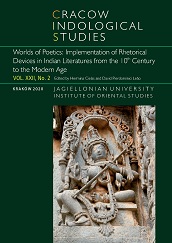Food and Love in Sanskrit Poetry: On the Margin of Desires
Food and Love in Sanskrit Poetry: On the Margin of Desires
Author(s): Danielle FellerSubject(s): Studies of Literature, Ancient World, 6th to 12th Centuries
Published by: KSIĘGARNIA AKADEMICKA Sp. z o.o.
Keywords: Sanskrit poetry; sexuality; food; wine; comparisons between body and food; stages of unrequited love; rasa; kāmaśāstras;
Summary/Abstract: In Western representations, food and sex are frequently connected and compared in an erotic context. A survey of Sanskrit poetry shows that it was not so in the context of ancient India, despite the kāmaśāstras’ dictates. Parts of women’s bodies are occasionally likened to certain items of food (mostly fruit and nectar), and can sometimes be drunk, but are rarely said to be eatable. Lovers who are madly in love or suffer from the pangs of separation lose their appetite, and in consequence become thin. In contexts of love-in-union, wine, but not food, is frequently consumed and appreciated for its aphrodisiac qualities. Except in some cases when the pairs of lovers are animals, or at least animal-like, descriptions of food consumption do not lead to the erotic flavour (śṛṅgāra-rasa), but rather lead to the comic (hāsya), sometimes disgusting flavour (bībhatsa-rasa). Food descriptions were probably considered improper for poetry, because food had too many unerotic associations, being a favourite topic of Sanskrit ritual, legal and medical treatises.
Journal: Cracow Indological Studies
- Issue Year: 21/2019
- Issue No: 2
- Page Range: 69-124
- Page Count: 56
- Language: English

